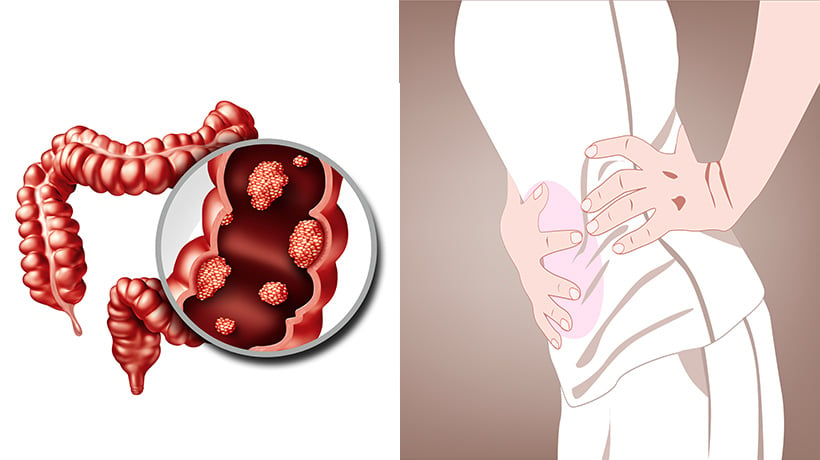The colon is a long tube-like organ that is part of the digestive system, states the Colon Cancer Coalition. After the digestive system absorbs the nutrients from the food we eat, the colon is responsible for taking away the remaining waste into the rectum for it to be expelled.
According to Everyday Health, colon cancer is cancer in the large intestine and is the most common cancer in the United States. It is also the second-leading cause of cancer deaths. National Cancer Institute says 39.4 per 100,000 men and women per year are diagnosed with colon cancer.
Symptoms of colon cancer
According to Memorial Sloan Kettering Cancer center, there are a few warning signs to know:
- Blood in stool
- Change in bowel habits (such as diarrhea, constipation, or narrow stool that lasts more than a few days)
- Unexplained abdominal pain or cramping
- Weakness and fatigue
- Unintentional weight loss
Risk factors
Cancer Treatment Centers of America says risk factors for colon cancer can vary. Some are not in our control such as genetics or age, but others are lifestyle choices such as diet or smoking. According to the Cancer Treatment Centers of America, here are some of the risk factors of colon cancer:
- Family history: Inherited genes, shared environmental factors or a combination of these influences can increase colon cancer risks. If a parent has colon cancer, there is potential for the next generation child to get colon cancer.
- Racial and ethnic background: It is mentioned that African Americans have the highest occurrence of colon cancer in the United States. Ashkenazi Jews also have a higher chance of developing it as well. This doesn’t mean if you are African American or Ashkenazi Jews, you’ll will have colon cancer, especially if you don’t have family history of colon cancer. However, it is always good to check up with a doctor.
- Diet: People who have diets that are high in red and processed meats increase the risk of getting colon cancer. A diet that is rich in fruits, vegetables and high-fiber grains can help reduce the risk of developing colon cancer.
- Smoking: Some of the cancer-causing substances that are associated with smoking can increase the risk of colon cancer.
- Alcohol: Heavy alcohol use is a risk factor for colon cancer.
- Age: Colon cancer can develop in any age; however, the ones most likely to develop colon cancer are those of the age of 45 and older.
- History of inflammatory bowel disease (IBD): Having IBD may increase the chances of colon cancer, depending on how much of the colon has been affected.
Preventative measures
There is good news. Colon cancer can be prevented if preventative measures are taken. According to Siteman Cancer Center:
- Get screened: Getting regular screening tests for colon cancer is a great way to catch cancer early. It also helps prevent the disease by finding abnormal growths called polyps that can turn into cancer.
- Maintain a healthy weight: Many cancers are linked to weight gain and obesity. A healthy weight can be maintained through a proper diet such incorporating vegetables and fruits into your normal diet.
- Stay physically active: Staying physically active lowers the risk of many serious diseases in general, including colon cancer, and it offers a good mental boost. Choose activities you would enjoy such as walking, cycling, or dancing.
- Increase calcium and vitamin D: There evidence that shows a sufficient amount of calcium and vitamin D can help protect against colon cancer. Experts even recommend testing for vitamin D deficiency.
Sources:
https://coloncancercoalition.org/get-educated/what-is-colon-cancer/
https://www.everydayhealth.com/colon-cancer/
https://seer.cancer.gov/statfacts/html/colorect.html
https://www.mskcc.org/cancer-care/types/colon/symptoms?gclid=CjwKCAiA45njBRBwEiwASnZT5zek82kMQnjCpYfvg9W5vNvuagoJpePD00eYULV3gS7h1hmSThuc0RoC7woQAvD_BwE
https://www.cancercenter.com/cancer-types/colorectal-cancer/risk-factors?invsrc=non_branded_paid_search_google&t_pur=prospecting&t_med=online&t_ch=paid_search&t_adg=58244578542&t_ctv=305604149020&t_mtp=e&t_pos=1t3&t_plc=kwd-820374366&t_si=google&t_tac=none&t_con=non_brand&t_bud=corp&t_d=c&t_tar=non_targeted&t_aud=any&kxconfid=s8ymtai82&dskid=%7btrackerid%7d&t_mod=cpc&t_cam=1604504776&t_trm=risk%20factors%20for%20colon%20cancer&t_src=g&gclid=CjwKCAiA45njBRBwEiwASnZT53I0oxNVXF9jQDRC_jRIXY9BMW5ltxmXR5VDz4cpJOUVn7kcSguECxoCWJwQAvD_BwE&gclsrc=aw.ds
https://siteman.wustl.edu/prevention/take-proactive-control/8-ways-to-prevent-colon-cancer/



